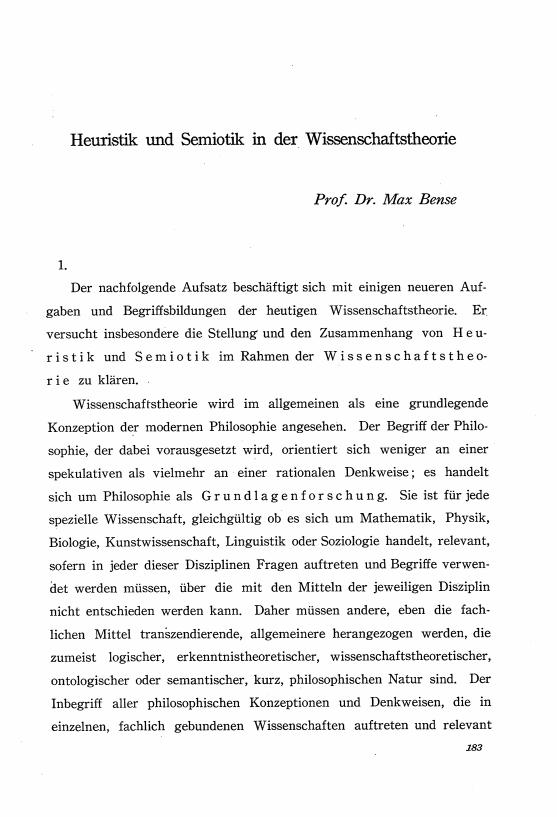1 0 0 0 OA 存在論と論理学
- 著者
- 速川 治郎
- 出版者
- The Philosophy of Science Society, Japan
- 雑誌
- 科学哲学 (ISSN:02893428)
- 巻号頁・発行日
- vol.1, pp.119-131, 1968-10-10 (Released:2009-05-29)
1 0 0 0 OA 数学の本質に関する人間学的考察
- 著者
- 竹崎 鼎輔
- 出版者
- The Philosophy of Science Society, Japan
- 雑誌
- 科学哲学 (ISSN:02893428)
- 巻号頁・発行日
- vol.1, pp.147-161, 1968-10-10 (Released:2009-05-29)
Every science must be based on anthropology, not on philosophy. This is because every science is created by man; and philosophy forms part of anthropology-an anthropology of the inner sense.To explain the essence of mathematics from the viewpoint of anthropology, especially of anthropology of the inner sense, I have classified knowledge in general into five categories to define what kind of knowledge mathematics is: (1) natural knowledge and artificial knowledge; (2) knowledge of the outer sense and knowledge of the inner sense ; (3) knowledge as reality and knowledge as memory; (4) knowledge as image and knowledge as language; (5) inductive knowledge and deductive knowledge.To apply this classification to mathematical knowledge, we must clarify what mathematical entity is. The physiological transformation of images, an a priori cerebral function which plays a main role in the formation of recognition, serves as a clue to the understanding of the essence of mathematical knowledge.If one recognizes this function by the inner sense, one can grasp the inner relation of quantity as, natural knowledge by the inner sense. Artificial beings realized by this philosophical knowledge is natural mathematical entity. Elementary mathematics, therefore, is a natural science, the object of which is such entity.The basis of the validity of inductive mathematical knowledge lies in entity itself and agrees with the provabitity of mathematical knowledge by means of deduction from axiom (the principle of cre-ation). Mathematics is, in this sense, an ideal model of natural science.
- 著者
- Max Bense
- 出版者
- The Philosophy of Science Society, Japan
- 雑誌
- 科学哲学 (ISSN:02893428)
- 巻号頁・発行日
- vol.1, pp.183-197, 1968-10-10 (Released:2009-05-29)
- 参考文献数
- 5
1 0 0 0 OA ルイス系S1の部分系S1'の構成とその決定手続きについて
- 著者
- 石本 新 藤川 吉美
- 出版者
- The Philosophy of Science Society, Japan
- 雑誌
- 科学哲学 (ISSN:02893428)
- 巻号頁・発行日
- vol.1, pp.9-22, 1968-10-10 (Released:2009-05-29)
- 参考文献数
- 12
This paper concerns the construction of a modal sentential calculus, which constitutes a subsystem of Lewis' S 1 and a decision method of the proposed calculus. The method represents a generalization of that rendered by McKinsey for Lewis' S 2 as well as for S 4 and is characterized by the construction of all the finite regular matrices containing not more than a certain number of elements specified by the given formula.
1 0 0 0 OA 必要性と導出可能性
- 著者
- 斎藤 晢朗
- 出版者
- The Philosophy of Science Society, Japan
- 雑誌
- 科学哲学 (ISSN:02893428)
- 巻号頁・発行日
- vol.1, pp.23-29, 1968-10-10 (Released:2009-05-29)
1 0 0 0 OA 三値論理学の基礎について
- 著者
- 高松 鶴吉
- 出版者
- The Philosophy of Science Society, Japan
- 雑誌
- 科学哲学 (ISSN:02893428)
- 巻号頁・発行日
- vol.1, pp.31-44, 1968-10-10 (Released:2009-05-29)
- 参考文献数
- 4
At the root of two-valued logic we use there is the assumption, which is usually not formulated explicitly, but is a basic one, and which is called the principle of two-values. This principle in twovalued logic corresponds to the principle of contradiction and the principle of the excluded middle. However, the principle of the syllogism in the usual (conjunctively transitive) formulation, and the principle of contradiction, of the excluded middle are only "possible" in three-valued logic. From this, three-valued logic are connected with a modal functor such as 'M' to be called "possible" (möglich). Furthermore, some laws of two-valued logic are false in three-valued logic, among others the law (a=a') = 0. From this fact results the absence of antinomies in three-valued logic.Thus any of many-valued logic from three-valued to infinitely many-valued is a proper part or a proper sublogic of two-valued logic, and the latter is a superlogic of the former.
1 0 0 0 OA 数理計画法とゲーム理論の形成体系
- 著者
- 江藤 肇
- 出版者
- The Philosophy of Science Society, Japan
- 雑誌
- 科学哲学 (ISSN:02893428)
- 巻号頁・発行日
- vol.1, pp.45-54, 1968-10-10 (Released:2009-05-29)
- 参考文献数
- 6
Some important parts of economics are formally stated in a finite manner in the sense that their syntax is given and that their theorems are proved without resorting to the compactness just under the assumptions the rational numbers and their arithmetical rules are finitely given. Firstly the syntax introduces the linear space spanned over the rational field which is shown to meet the so-called axioms of the linear space. The simplex algorithm of linear programming provides a finite tool to develop the linear algebra and its. geometric representation which, on the contrary, usually in nonfinite systems deduce it. The basic parts of the game theory and non-linear programming are shown to be expressible in a finite manner as well. Economic behaviors besides games are also seen to be expressed by finite mathematics. Lastly it is remarked that the integer programming algorithms as the most powerful tool for finite systems are finite.
1 0 0 0 エチメンディのモデル理論的帰結批判
- 著者
- 金田 明子
- 出版者
- The Philosophy of Science Society, Japan
- 雑誌
- 科学哲学 (ISSN:02893428)
- 巻号頁・発行日
- vol.39, no.2, pp.43-55, 2006
In his book, The Concept of Logical Consequence, Etchemendy claims that the currently standard model-theoretic account of logical consequence is "the interpretational semantics" and does not capture logicality. The purpose of this paper is to defend the model-theoretic account from Etchemendy's criticisms. Through comparison with Sher's "Tarskian logic" and her model-theoretic definition of logical constants, I aim to demonstrate that the basis of Etchemendy's arguments are mistaken. I then explain that the model-theoretic account of logical consequence guarantees its logicality by the semantic functions of logical constants.
- 著者
- 太田 紘史
- 出版者
- 日本科学哲学会
- 雑誌
- 科学哲学 (ISSN:02893428)
- 巻号頁・発行日
- vol.52, no.1, pp.143-162, 2019
<p> In his recent book, Takayuki Suzuki proposes a novel physicalist solution toward the hard problem of consciousness, wherein the representationalist analysis of qualia is advanced via incorporating the intrinsic notion of representation. In this review, I critically examine the metaphysical character of his resultant position and present some questions on to what extent it satisfies the core theses of physicalism. The moral to be drawn is the significant tension between physicalism and the phenomenal principle, whose endorsement could misdirect us into troublesome positions in an unexpected manner.</p>
1 0 0 0 社会学理論の進化的視点からの拡充をめぐって
- 著者
- 伊勢田 哲治
- 出版者
- 日本科学哲学会
- 雑誌
- 科学哲学 (ISSN:02893428)
- 巻号頁・発行日
- vol.34, no.2, pp.45-57, 2001
This paper discusses how evolutionary biology can contribute to sociological theory. I maintain that a biological understanding of human being can function as a common language among various competing trends in sociological theory. Sociologists do not use biological insights much, but one of the reasons for this is that simply they are not sure how such insights relate to their own research interests. My main purpose in this paper is to give an example of an enhancement of social theory (a conflict analysis of stratification) from an evolutionary point of view, hoping to remedy the 'biophobic' attitude of some sociological theorists.
1 0 0 0 宿命論について
- 著者
- 野矢 茂樹
- 出版者
- 日本科学哲学会
- 雑誌
- 科学哲学 (ISSN:02893428)
- 巻号頁・発行日
- vol.37, no.2, pp.47-58, 2004
Fatalism or logical determinism says that the future is determined on a very logical ground. In this paper, examining the fatalist argument critically, I am going to show how we can avoid the fatalist thesis. Aristotle discussed this problem and came to the conclusion that some statements about the future are neither true nor false. Following his suggestion, I farther claim that the future does not exist. That is the reason why any proper name included in a statement about the future has no referent. Therefore, as Aristotle said, statements about the future have no truth value. In the latter half of this paper, I will consider some problems with my claim what does a statement about the future mean and how is the past related to the present?
1 0 0 0 理由の内在主義と外在主義
- 著者
- 鴻 浩介
- 出版者
- 日本科学哲学会
- 雑誌
- 科学哲学 (ISSN:02893428)
- 巻号頁・発行日
- vol.49, no.2, pp.27-47, 2016
<p> A normative reason is a consideration that counts in favor of doing something. According to Internalism about reasons, a consideration is a normative reason for an agent to do something only if that consideration is capable of motivating the agent to do that action. Externalism about reasons denies this claim. After surveying the debate between Internalism and Externalism, I defend the oldest version of Internalism, that is, Bernard Williamsʼ deliberative Internalism. My argument is twofold: first I argue that there is a specific motivation for adopting deliberative Internalism, and then try to address the most serious objection against Internalism, <i>i.e.</i>, the undergeneration problem.</p>
- 出版者
- 日本科学哲学会
- 雑誌
- 科学哲学 (ISSN:02893428)
- 巻号頁・発行日
- vol.39, no.1, pp.104-106, 2006
1 0 0 0 Truthmaker原理はなぜ制限されるべきか
- 著者
- 秋葉 剛史
- 出版者
- 日本科学哲学会
- 雑誌
- 科学哲学 (ISSN:02893428)
- 巻号頁・発行日
- vol.44, no.2, pp.2_115-2_134, 2011
- 被引用文献数
- 3
According to the “truthmaker maximalism”, every true contingent proposition is made true by something in the world, called its <I>truthmaker</I>. Although at first sight the maximalism seems to be a natural position, it has serious difficulties, especially concerning negative truths. In view of this, many truthmaker theorists adopt some non-maximalist position. It is not clear, however, whether these non-maximalists are justified, since existing reasons to justify the non-maximalism are not good enough. In this paper, then, I shall propose a new reason for the non-maximalism, which consists in the observation that the maximalism cannot acknowledge the widely accepted view that certain inferences involving logical constants are valid in the properly logical sense.
1 0 0 0 社会科学方法論をめぐる現状について
- 著者
- 竹内 啓
- 出版者
- 日本科学哲学会
- 雑誌
- 科学哲学 (ISSN:02893428)
- 巻号頁・発行日
- vol.13, pp.35-48, 1980
1 0 0 0 生きた知識の仕組:認識科学による科学哲学の新武装
- 著者
- 川野 洋
- 出版者
- 日本科学哲学会
- 雑誌
- 科学哲学 (ISSN:02893428)
- 巻号頁・発行日
- vol.15, pp.15-30, 1982
1 0 0 0 異世界像:その表現と理解
- 著者
- 川野 洋
- 出版者
- 日本科学哲学会
- 雑誌
- 科学哲学 (ISSN:02893428)
- 巻号頁・発行日
- vol.24, pp.1-16, 1991
1 0 0 0 スワンプマンにさよならする
- 著者
- 前田 高弘
- 出版者
- 日本科学哲学会
- 雑誌
- 科学哲学 (ISSN:02893428)
- 巻号頁・発行日
- vol.32, no.1, pp.67-81, 1999
注意されたいのは,私はスワンプマンがある種の生物学的機能や心的特性(ないしそれに似た何か)をもつことを否定してはいないということだ.スワンプマンが通常の照明の下で赤いリンゴを目の前にしたとき,彼はあなたが同様の条件下でもつ経験と同じ経験をもつという直観は,内在主義というより,物理的スーパーヴィニエンスに基づく自然主義に由来するものであるように思われる.だが他方で,心的特性を進化論的な観点によって捉えようとする外在主義も同様の自然主義によって動機づけられており,本稿は,この自然主義の内部における対立を調停する試みであると言える.この試みによって,外在主義者たちがスワンプマンに悩まされなくなれば幸いである.だが,たとえそうならなくても,スワンプマンを自然法則に関する形而上学的問題の中に位置づけることによって,志向性や感覚質に関する哲学的議論の場そのものからはスワンプマンに別れを告げることができれば私は満足である.そこではドッペルゲンガーだけで十分だろう.
- 著者
- 谷川 卓
- 出版者
- The Philosophy of Science Society, Japan
- 雑誌
- 科学哲学 (ISSN:02893428)
- 巻号頁・発行日
- vol.47, no.1, pp.37-51, 2014
David Lewis argues that the thesis of Humility follows from two metaphysical principles; combinatorial principle and quidditism. The thesis has received attention of philosophers because of its skeptical implication, but only by focusing on that point one may underestimate the significance of Humility. Another implication drawn from the thesis pertains to the methodological issue, that is, justification of metaphysical principles. A key for the justification of two metaphysical principles in question is correspondence between our thought and the world, and it is required to develop modal epistemology in the way to oppose to Saul Kripkes view.
1 0 0 0 因果必然性と主観的必然性:新ヒューム主義試論
- 著者
- 内井 惣七
- 出版者
- 日本科学哲学会
- 雑誌
- 科学哲学 (ISSN:02893428)
- 巻号頁・発行日
- no.6, pp.7-17, 1973


